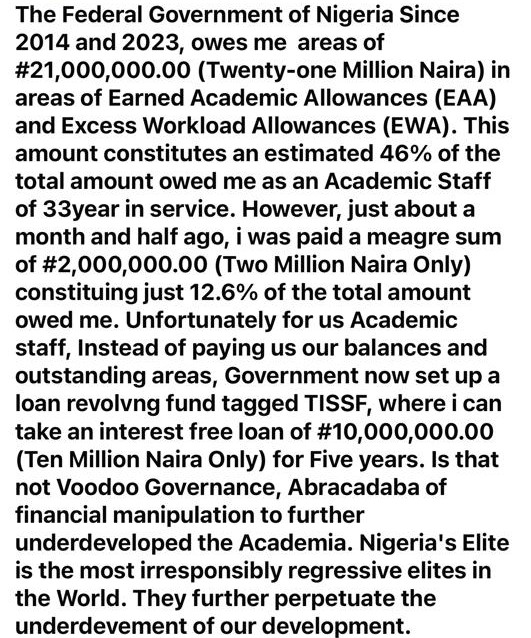The Academic Staff Union of Universities (ASUU) in Nigeria is lost in a National Executive Council (NEC) meeting in Sokoto, Sokoto State. There are no hints about what the outcome of the meeting might be.
Nobody will, however, be surprised if, typical of recent ASUU NEC meetings, this one too turns out a war cabinet in session. Those who successfully ‘read’ ASUU mood suggest a storm could yet greet Nigeria from the Sokoto meeting. Although substantially war weary, ASUU has a leadership team that has not tasted battle yet and may be inclined to test strength.
Intervention is learning that there are many unresolved issues over which ‘war’ could break out between ASUU and the owner of majority of the universities in Nigeria – the FG. One of such issues came out in a private WhatsApp communication available to Intervention. Casually written and grammatically messed up here and there by auto-correct technology, the communication is clear on where the trigger for the next trouble may be coming from.
It is a communication to take seriously because, as ‘experts’ of ASUU warfare told Intervention, ASUU hardly ever lose battles that have economistic components. All such battles since 1993 have ended on a success note for ASUU, be it against military or civilian regime. In other words, ASUU hardly succeeds when they wage ideological wars such as their classic failure on June 12 but that hardly happens whenever they embark on strikes which have demands bordering on salary condition and/or financial contents. The current anger falls into the latter category.
ASUU henchmen/women are actually wondering if people in government think. For them, it is about “a government that doesn’t want to pay workers well but wants them to take imaginary loans”. And the question they ask is “what kind of bizarre economics is that and from which schools did people in government learn such?
As an ASUU activist asked, “who told them that academics are looking for N1-2.5m?”. Continuing, he argues how most academics already belong to co-operatives from where they can negotiate loans terms. But, as he alleges, the problem is that the government is doing everything to destroy the co-operatives.
What the above rumblings suggest, especially if they reflect the sentiments within NEC of ASUU, is that the Federal Government might still have not resolved the demands of ASUU. Interestingly, every regime since 1999 has had to contend with basically the same demands from ASUU.
The Obasanjo regime went farthest by thinking that it found the answer in what the then president himself called the strategy of “flooding Nigeria with private universities” as a way of undermining ASUU. Nigeria has been flooded with private universities but no private universities has started with training new sets of academics or research agenda different or distinct from the aggregate orientation. Instead, the private universities fell back on the stock of academics in the existing public universities, overstretching the human resource base and worsening the quality crisis since the early 1990s.
ASUU has been growing stronger without private universities training new PhDs to be able to raise the standards higher and become more attractive compared to public universities. Up till today, the public universities are closer to the university idea than any private university anywhere in Nigeria, Intervention has been told by several persons who should know.
So, contrary to Chief Obasanjo’s thesis, ASUU dictates the industrial relations tune, being more entrenched in those matters after many years of battles and experience of enduring all manner of humiliations in the hands of different administrations. It has survived attempts to break it too. But the crisis is deepening.
Yet, the solutions are not coming. The TetFund idea which ASUU brought up as a way of shielding public universities from budgetary fluctuations due to IMF/World Bank conditionalities has generated huge sums of money but which is spent more on aesthetically dispiriting infrastructures all over the country than cushioning universities against budgetary fluctuations. As the welfare of academics declines, so does quality and the standards that could put any Nigerian universities in the global top 500.
Not only is the motivation level even in the First generation universities too low to sustain the sort of research output that can make Nigerian universities achieve that, the atmosphere on most campuses is against the quietism required for that direction. Right now, Nigerian universities begin to appear on ranking lists after the first 1000 when the total number on most lists are around 1500.
This contrasts sharply with South Africa and Egypt, the other two of the power houses from Africa which have universities in the list of the first global 200. Certainly, there are no less than at least two South African universities within that caste. Egypt is not far behind.
Yet, no regime since 1999 has felt embarrassed enough about this as to do the very simple things required to change the situation, one of which is an NUC that knows what is going on in the global politics of contemporary knowledge production. The Yar’Adua FG sought to cut into the crisis by arranging a one – one meeting with ASUU. It didn’t go far before he became incapable of sustaining the point of departure.
The question is how Nigeria could deliberately lock itself in the class of international nonentity in an area it could very easily lead the rest of Africa?




























